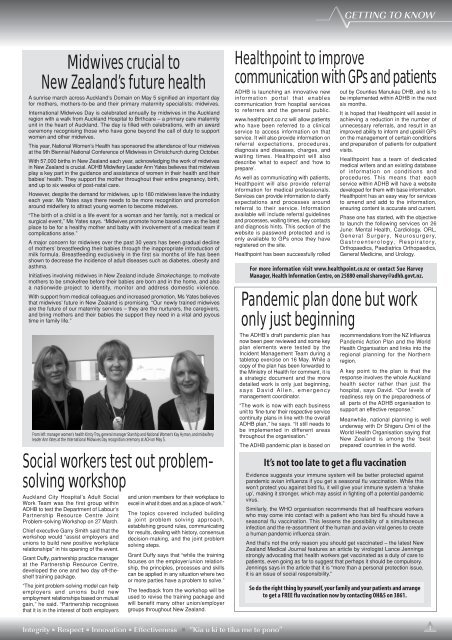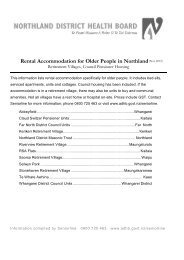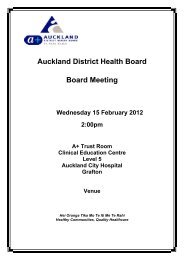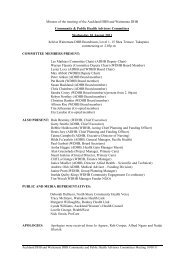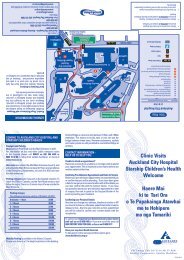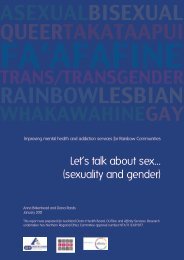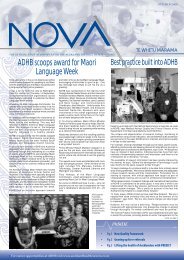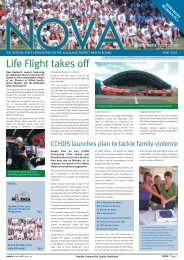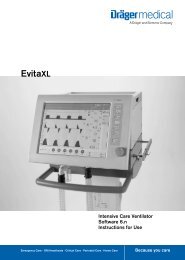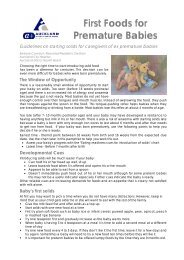NOVA - June.fh9 copy - Auckland District Health Board
NOVA - June.fh9 copy - Auckland District Health Board
NOVA - June.fh9 copy - Auckland District Health Board
Create successful ePaper yourself
Turn your PDF publications into a flip-book with our unique Google optimized e-Paper software.
Midwives crucial to<br />
New Zealand’s future health<br />
A sunrise march across <strong>Auckland</strong>’s Domain on May 5 signified an important day<br />
for mothers, mothers-to-be and their primary maternity specialists: midwives.<br />
International Midwives Day is celebrated annually by midwives in the <strong>Auckland</strong><br />
region with a walk from <strong>Auckland</strong> Hospital to Birthcare – a primary care maternity<br />
unit in the heart of <strong>Auckland</strong>. The day is filled with celebrations, with an award<br />
ceremony recognising those who have gone beyond the call of duty to support<br />
women and other midwives.<br />
This year, National Women’s <strong>Health</strong> has sponsored the attendance of four midwives<br />
at the 9th Biennial National Conference of Midwives in Christchurch during October.<br />
With 57,000 births in New Zealand each year, acknowledging the work of midwives<br />
in New Zealand is crucial. ADHB Midwifery Leader Ann Yates believes that midwives<br />
play a key part in the guidance and assistance of women in their health and their<br />
babies’ health. They support the mother throughout their entire pregnancy, birth,<br />
and up to six weeks of post-natal care.<br />
However, despite the demand for midwives, up to 180 midwives leave the industry<br />
each year. Ms Yates says there needs to be more recognition and promotion<br />
around midwifery to attract young women to become midwives.<br />
“The birth of a child is a life event for a woman and her family, not a medical or<br />
surgical event,” Ms Yates says. “Midwives promote home based care as the best<br />
place to be for a healthy mother and baby with involvement of a medical team if<br />
complications arise.”<br />
A major concern for midwives over the past 30 years has been gradual decline<br />
of mothers’ breastfeeding their babies through the inappropriate introduction of<br />
milk formula. Breastfeeding exclusively in the first six months of life has been<br />
shown to decrease the incidence of adult diseases such as diabetes, obesity and<br />
asthma.<br />
Initiatives involving midwives in New Zealand include Smokechange, to motivate<br />
mothers to be smokefree before their babies are born and in the home, and also<br />
a nationwide project to identify, monitor and address domestic violence.<br />
With support from medical colleagues and increased promotion, Ms Yates believes<br />
that midwives’ future in New Zealand is promising. “Our newly trained midwives<br />
are the future of our maternity services – they are the nurturers, the caregivers,<br />
and bring mothers and their babies the support they need in a vital and joyous<br />
time in family life.”<br />
From left: manager women’s health Kirsty Troy, general manager Starship and National Women’s Kay Hyman, and midwifery<br />
leader Ann Yates at the International Midwives Day recognition ceremony at ACH on May 5.<br />
Social workers test out problemsolving<br />
workshop<br />
<strong>Auckland</strong> City Hospital’s Adult Social<br />
Work Team was the first group within<br />
ADHB to test the Department of Labour’s<br />
Partnership Resource Centre Joint<br />
Problem-solving Workshop on 27 March.<br />
Chief executive Garry Smith said that the<br />
workshop would “assist employers and<br />
unions to build new positive workplace<br />
relationships” in his opening of the event.<br />
Grant Duffy, partnership practice manager<br />
at the Partnership Resource Centre,<br />
developed the one and two day off-theshelf<br />
training package.<br />
“The joint problem-solving model can help<br />
employers and unions build new<br />
employment relationships based on mutual<br />
gain,” he said. “Partnership recognises<br />
that it is in the interest of both employers<br />
and union members for their workplace to<br />
excel in what it does and as a place of work.”<br />
The topics covered included building<br />
a joint problem solving approach,<br />
establishing ground rules, communicating<br />
for results, dealing with history, consensus<br />
decision-making, and the joint problem<br />
solving steps.<br />
Grant Duffy says that “while the training<br />
focuses on the employer/union relationship,<br />
the principles, processes and skills<br />
can be applied in any situation where two<br />
or more parties have a problem to solve.”<br />
The feedback from the workshop will be<br />
used to revise the training package and<br />
will benefit many other union/employer<br />
groups throughout New Zealand.<br />
Integrity Respect Innovation Effectiveness “Kia u ki te tika me te pono”<br />
GETTING TO KNOW<br />
<strong>Health</strong>point to improve<br />
communication with GPs and patients<br />
ADHB is launching an innovative new<br />
information portal that enables<br />
communication from hospital services<br />
to referrers and the general public.<br />
www.healthpoint.co.nz will allow patients<br />
who have been referred to a clinical<br />
service to access information on that<br />
service. It will also provide information on<br />
referral expectations, procedures,<br />
diagnosis and diseases, charges, and<br />
waiting times. <strong>Health</strong>point will also<br />
describe ‘what to expect’ and ‘how to<br />
prepare’.<br />
As well as communicating with patients,<br />
<strong>Health</strong>point will also provide referral<br />
information for medical professionals.<br />
Services can provide information to clarify<br />
expectations and processes around<br />
referral to their service. Information<br />
available will include referral guidelines<br />
and processes, waiting times, key contacts<br />
and diagnosis hints. This section of the<br />
website is password protected and is<br />
only available to GPs once they have<br />
registered on the site.<br />
<strong>Health</strong>point has been successfully rolled<br />
out by Counties Manukau DHB, and is to<br />
be implemented within ADHB in the next<br />
six months.<br />
It is hoped that <strong>Health</strong>point will assist in<br />
achieving a reduction in the number of<br />
unnecessary referrals, and result in an<br />
improved ability to inform and upskill GPs<br />
on the management of certain conditions<br />
and preparation of patients for outpatient<br />
visits.<br />
<strong>Health</strong>point has a team of dedicated<br />
medical writers and an existing database<br />
of information on conditions and<br />
procedures. This means that each<br />
service within ADHB will have a website<br />
developed for them with base information.<br />
<strong>Health</strong>point has an easy way for services<br />
to amend and add to the information,<br />
ensuring content is accurate and current.<br />
Phase one has started, with the objective<br />
to launch the following services on 26<br />
<strong>June</strong>: Mental <strong>Health</strong>, Cardiology, ORL,<br />
General Surgery, Neurosurgery,<br />
Gastroenterology, Respiratory,<br />
Orthopaedics, Paediatrics Orthopaedics,<br />
General Medicine, and Urology.<br />
For more information visit www.healthpoint.co.nz or contact Sue Harvey<br />
Manager, <strong>Health</strong> Information Centre, on 25880 email sharvey@adhb.govt.nz.<br />
Pandemic plan done but work<br />
only just beginning<br />
The ADHB’s draft pandemic plan has<br />
now been peer reviewed and some key<br />
plan elements were tested by the<br />
Incident Management Team during a<br />
tabletop exercise on 16 May. While a<br />
<strong>copy</strong> of the plan has been forwarded to<br />
the Ministry of <strong>Health</strong> for comment, it is<br />
a strategic document and the more<br />
detailed work is only just beginning,<br />
says David Allen, emergency<br />
management coordinator.<br />
“The work is now with each business<br />
unit to ‘fine-tune’ their respective service<br />
continuity plans in line with the overall<br />
ADHB plan,” he says. “It still needs to<br />
be implemented in different areas<br />
throughout the organisation.”<br />
The ADHB pandemic plan is based on<br />
recommendations from the NZ Influenza<br />
Pandemic Action Plan and the World<br />
<strong>Health</strong> Organisation and links into the<br />
regional planning for the Northern<br />
region.<br />
A key point to the plan is that the<br />
response involves the whole <strong>Auckland</strong><br />
health sector rather than just the<br />
hospital, says David. “Our levels of<br />
readiness rely on the preparedness of<br />
all parts of the ADHB organisation to<br />
support an effective response.”<br />
Meanwhile, national planning is well<br />
underway with Dr Shigeru Omi of the<br />
World <strong>Health</strong> Organisation saying that<br />
New Zealand is among the ‘best<br />
prepared’ countries in the world.<br />
It’s not too late to get a flu vaccination<br />
Evidence suggests your immune system will be better protected against<br />
pandemic avian influenza if you get a seasonal flu vaccination. While this<br />
won’t protect you against bird flu, it will give your immune system a ‘shake<br />
up’, making it stronger, which may assist in fighting off a potential pandemic<br />
virus.<br />
Similarly, the WHO organisation recommends that all healthcare workers<br />
who may come into contact with a patient who has bird flu should have a<br />
seasonal flu vaccination. This lessens the possibility of a simultaneous<br />
infection and the re-assortment of the human and avian viral genes to create<br />
a human pandemic influenza strain.<br />
And that’s not the only reason you should get vaccinated – the latest New<br />
Zealand Medical Journal features an article by virologist Lance Jennings<br />
strongly advocating that health workers get vaccinated as a duty of care to<br />
patients, even going as far to suggest that perhaps it should be compulsory.<br />
Jennings says in the article that it is “more than a personal protection issue,<br />
it is an issue of social responsibility.”<br />
So do the right thing by yourself, your family and your patients and arrange<br />
to get a FREE flu vaccination now by contacting OH&S on 3861.<br />
3


